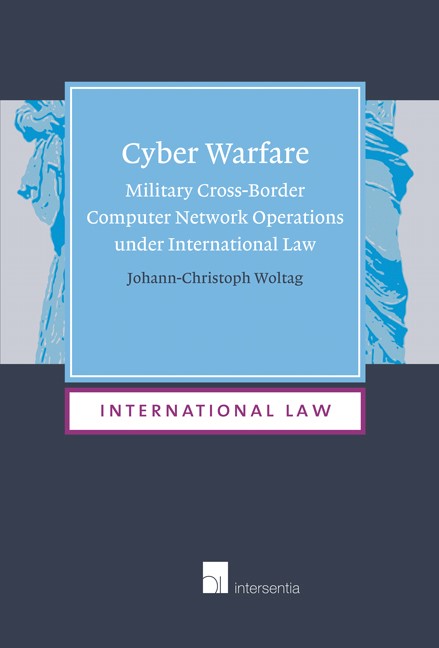Book contents
- Frontmatter
- Dedication
- Acknowledgements
- Contents
- Abbreviations
- Introduction
- PART I THE INTERNET AS A UNIVERSAL YET TERRITORIALISED INFRASTRUCTURE
- PART II THE LEGAL QUALIFICATION OF COMPUTER NETWORK OPERATIONS
- Chapter 3 Computer Network Operations Outside of Armed Conflict
- Chapter 4 The Justified Use of Forceful Computer Network Operations
- Chapter 5 Computer Network Operations During an International Armed Conflict
- Chapter 6 Neutrality in Cyber Warfare
- PART III CONCLUSION
- Bibliography
Chapter 6 - Neutrality in Cyber Warfare
from PART II - THE LEGAL QUALIFICATION OF COMPUTER NETWORK OPERATIONS
Published online by Cambridge University Press: 28 November 2017
- Frontmatter
- Dedication
- Acknowledgements
- Contents
- Abbreviations
- Introduction
- PART I THE INTERNET AS A UNIVERSAL YET TERRITORIALISED INFRASTRUCTURE
- PART II THE LEGAL QUALIFICATION OF COMPUTER NETWORK OPERATIONS
- Chapter 3 Computer Network Operations Outside of Armed Conflict
- Chapter 4 The Justified Use of Forceful Computer Network Operations
- Chapter 5 Computer Network Operations During an International Armed Conflict
- Chapter 6 Neutrality in Cyber Warfare
- PART III CONCLUSION
- Bibliography
Summary
The principle of neutrality obliges States not involved in an armed conflict to maintain impartiality and non-discrimination towards the conflict parties, while in turn ensuring that neutral States will kept out of the conflict. In the relations between belligerents and neutral States a courant normal – the continuance of the commercial relations existing before the armed conflict – shall be observed. As a result, the law applicable between the conflict parties and the neutral State is not that of armed conflict but of general international law, modified by certain regulations arising from the laws of neutrality. The neutral status of a State is considered to emerge ipso iure at the outbreak of armed conflict, whereas the degree of armed force necessary to reach the threshold of an armed conflict under the laws of neutrality remains disputed. The two 1907 Hague Conventions (V and XIII) relating to the rights and duties of neutrals in case of war on land and naval warfare, respectively, are the latest codifications on the topic, though further provisions dealing with neutrality are included in the more recent Geneva Conventions of 1949 and Additional Protocol I thereto. Given the small number of ratifications of the Hague Conventions and subsequent State practice, this hardly supports the thesis that the Conventions state current customary international law on the issue of neutrality. The essential aspects of the laws of neutrality have rather been developed through State practice, while under certain circumstances both the UN Charter and UN Security Council decisions may provide for modifications. Studies attempting to restate customary international law of naval and aerial warfare likewise include rules on neutrality in the respective frameworks, and the Tallinn Manual has also incorporated relevant rules. Obviously the Hague Conventions could not take into account the revolution in communications technology in the past decades and thus do not expressly include computer network operations. Their specific regulations are thus not directly applicable to CNAs, but as they depict particularities of the general principles of neutrality law they can be drawn upon in a subsidiary manner when addressing new forms of warfare. In any case it is undisputed that the duty to respect the integrity of neutral States during armed conflict exists for all kinds of warfare, hence also cyber warfare.
- Type
- Chapter
- Information
- Cyber WarfareMilitary Cross-Border Computer Network Operations under International Law, pp. 259 - 270Publisher: IntersentiaPrint publication year: 2014



